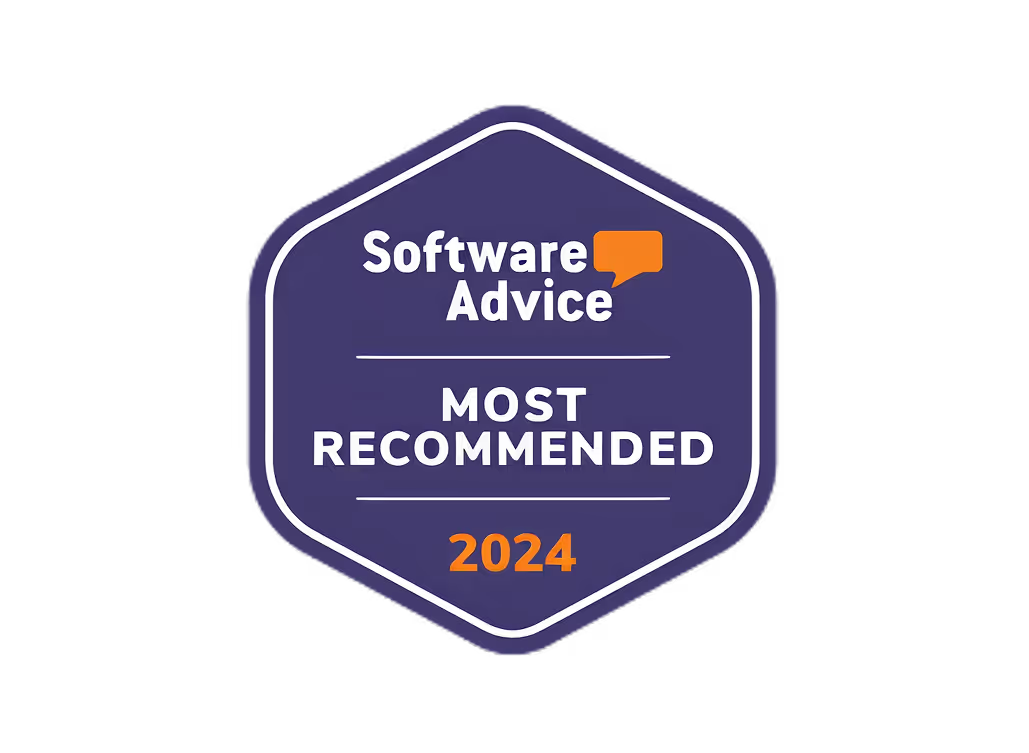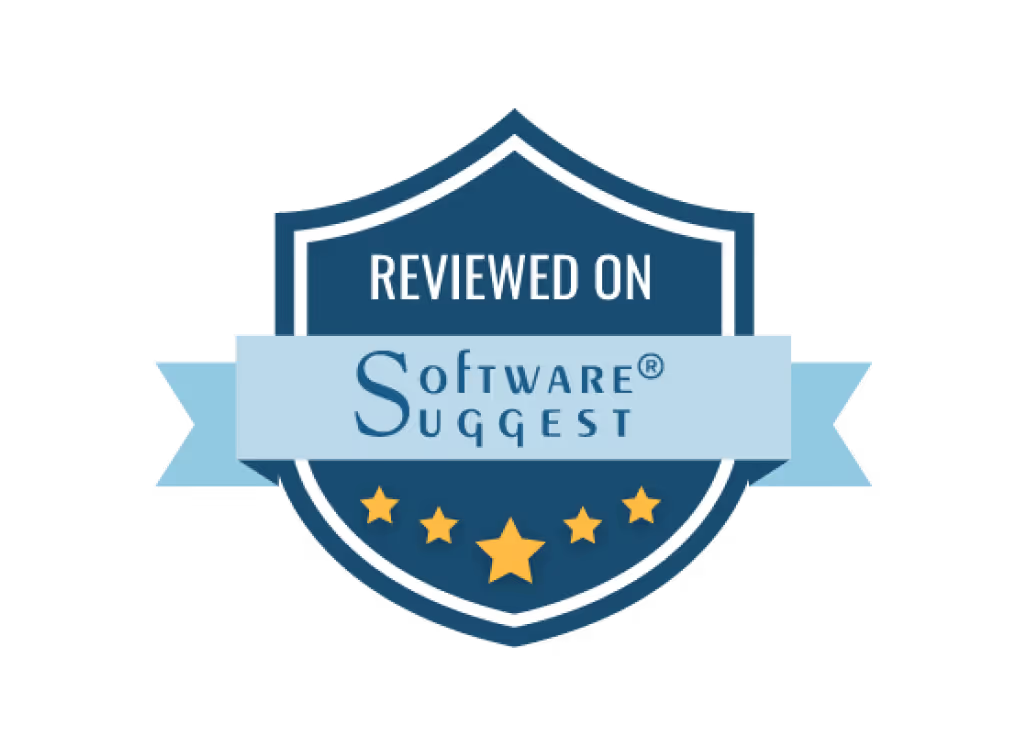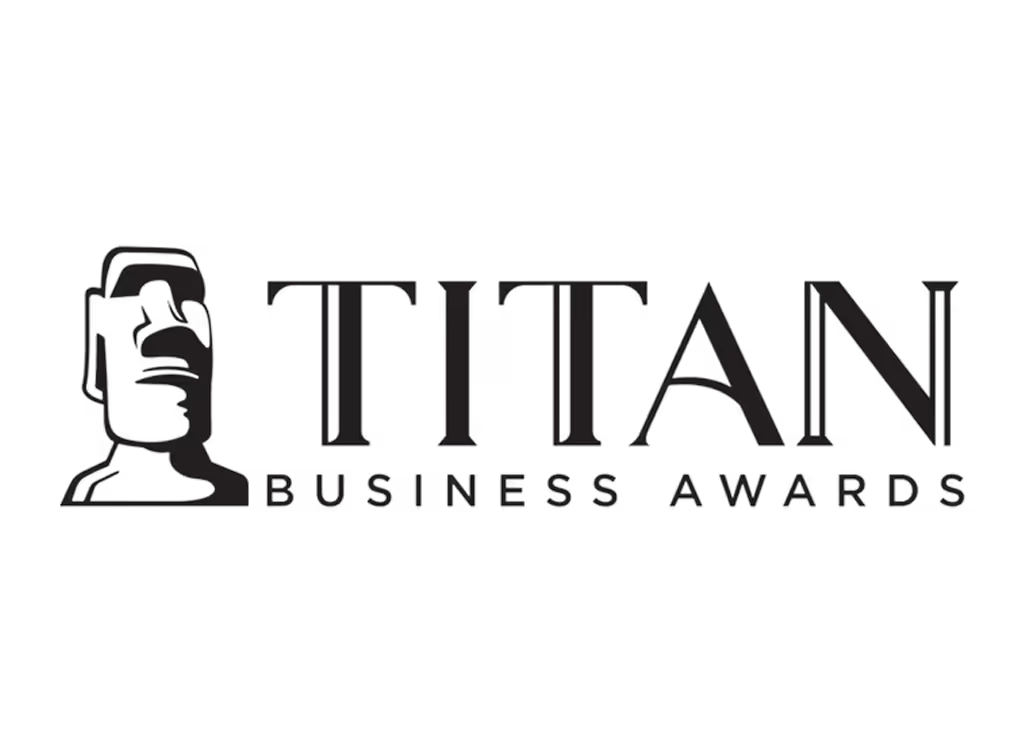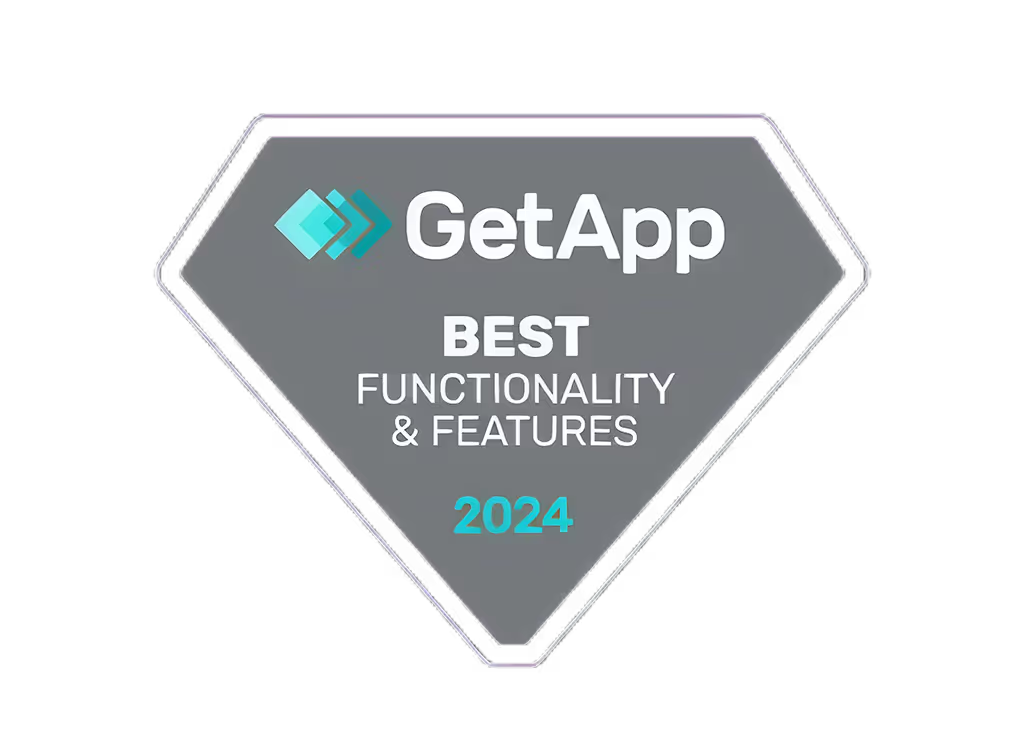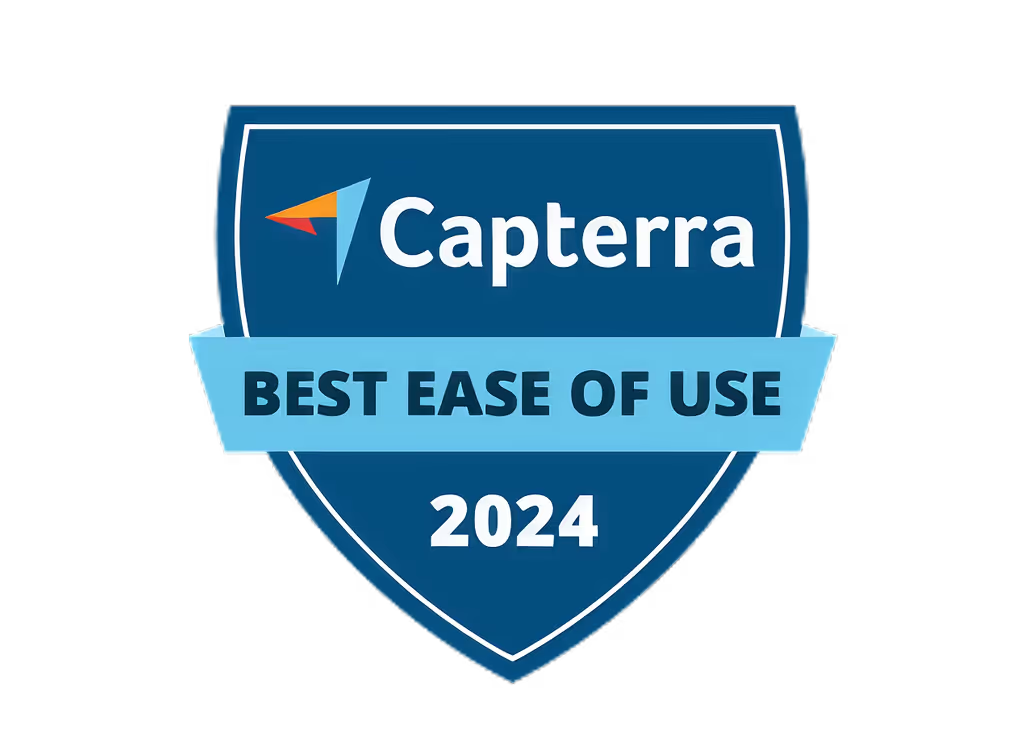The 12 Best AI Marketing Tools for Growth in 2025

Navigating the crowded market of AI marketing tools can feel overwhelming. The promise of boosting ROI, automating tedious tasks, and unlocking creative potential is everywhere, but cutting through the noise to find the right solutions for your specific needs is a significant challenge. Marketing managers, agency owners, and founders need more than just a list of names; they need a practical guide that connects tools to tangible business outcomes.
This resource is designed to be that guide. We've gone beyond surface-level descriptions to provide an in-depth analysis of the best AI marketing tools available today, organized by critical marketing functions: ad creation, content generation, analytics, and automation. Our goal is to help you move from consideration to implementation with confidence.
Inside, you will find a curated selection of platforms, each evaluated for its core strengths and ideal use cases. We provide:
- Concise Summaries: Quickly understand what each tool does and who it's for.
- Pros and Cons: An honest look at the advantages and limitations based on real-world application.
- Pricing Breakdowns: Clear information to help you align solutions with your budget.
- Example Workflows: Practical scenarios, including how a tool like Quickads.ai integrates into a creative workflow, to help you visualize its impact.
Each entry includes screenshots and direct links, allowing you to explore these platforms yourself. This is not just a list; it's a strategic playbook to help you select and deploy the AI tools that will genuinely supercharge your marketing efforts and drive measurable growth.
1. Quickads.ai
Best for: End-to-end, data-driven ad creative generation and campaign launch.
Quickads.ai positions itself as a powerhouse among the best AI marketing tools by providing a comprehensive, end-to-end solution for creating, optimizing, and launching high-performance ad campaigns. It masterfully combines a massive ad intelligence database with a suite of generative AI tools, allowing marketers to move from insight to execution within a single platform. This integrated workflow is its core differentiator, eliminating the need to stitch together multiple disparate tools for ad research, creative production, and media buying.
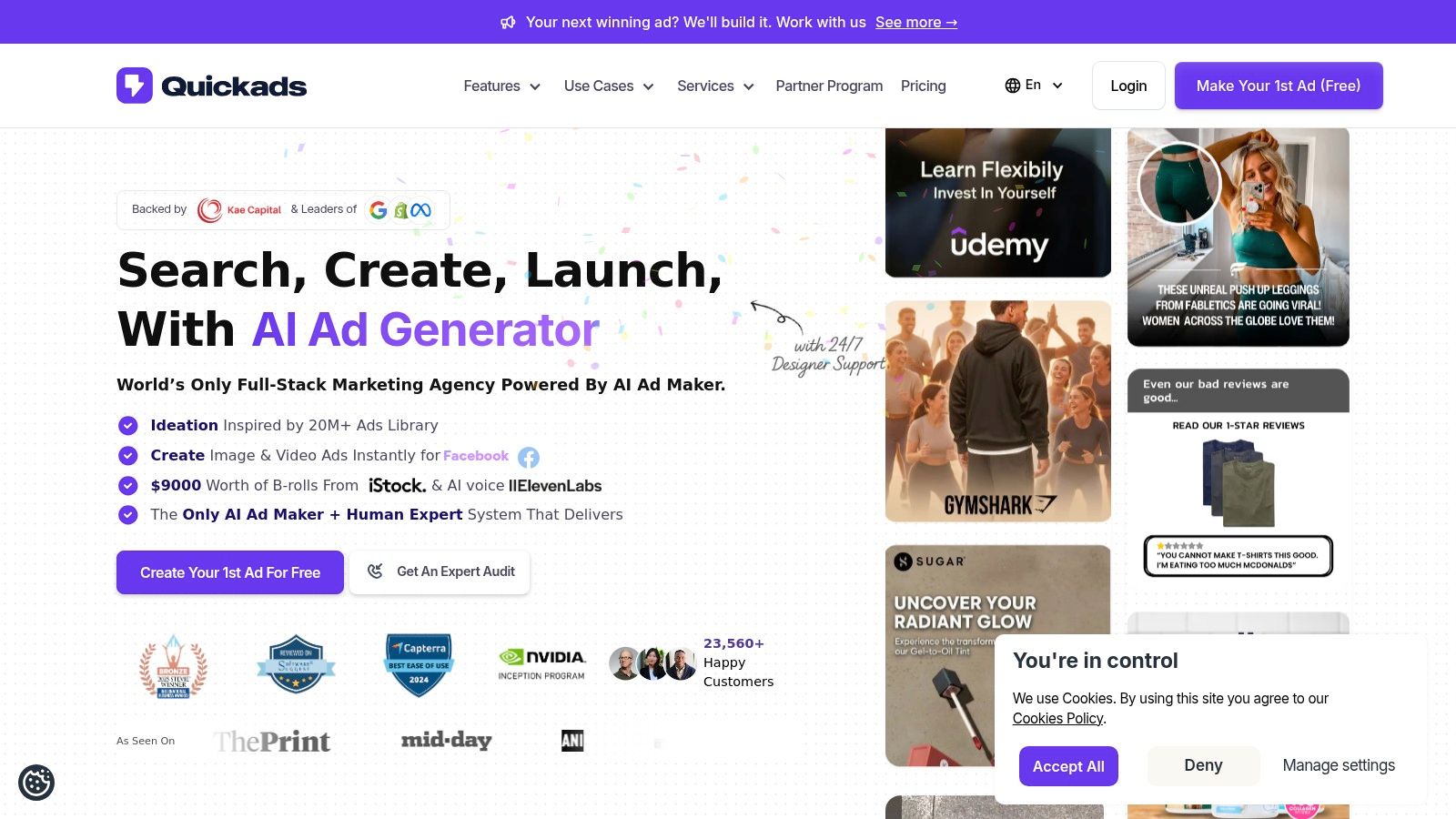
The platform is built on a foundation of data. Users gain access to an AI-analyzed library of over 20 million ad creatives from Meta, TikTok, and more. This isn't just a swipe file; the AI surfaces winning hooks, analyzes competitor strategies, and provides data-backed inspiration to inform your creative direction before you even begin production. This initial research step significantly increases the probability of campaign success.
Key Features and Workflow
From there, the generative tools take over. Quickads.ai can produce a wide array of ad formats, including static images, UGC-style videos, and even faceless YouTube shorts, often in under a minute. One of its most innovative features is the virtual photoshoot capability, which allows e-commerce and fashion brands to generate high-quality product and model shots without the time and expense of a physical studio.
Once creatives are generated, the workflow continues with integrated optimization and publishing. You can schedule, A/B test, and launch campaigns directly to Facebook, Instagram, TikTok, Google, and YouTube from one unified dashboard, streamlining a process that is typically fragmented and time-consuming.
Real-World Impact: Quickads.ai reports an average ROAS of 5.12x for its customers, demonstrating a tangible link between its data-informed creative process and measurable business results.
Pricing and Access
- Free Trial: A $1 trial is available to test the platform's capabilities.
- All-Access Plan: A popular tier at $99/month offers a well-rounded feature set for individual users and small teams.
- License Plans: Range from approximately $69 to $739, providing tiered access to features like download credits and video generation minutes.
- Creative Services: For brands needing more hands-on support, monthly packages range from $199 to over $2,999.
- Enterprise: Custom pricing is available for large-scale agency and brand needs.
ProsConsData-Driven Creative: 20M+ ad library provides proven concepts and hooks.Cost for Scale: High-volume usage, especially video and photoshoots, requires more expensive plans.End-to-End Workflow: Unifies ad research, creation, and publishing.AI Still Needs Oversight: Outputs require human review to ensure brand alignment and compliance.Rapid Production: Drastically reduces the time and cost of creating diverse ad assets.Flexible Service Tiers: Options range from pure SaaS to full-service agency support.
Website: https://www.quickads.ai
2. Jasper
Jasper positions itself as an AI copilot built specifically for marketing teams, moving beyond generic text generation to become a core part of a brand's content engine. Its standout feature is the ability to learn and replicate a specific brand voice, ensuring consistency across all marketing channels, from ad copy and social media posts to website content and emails. This makes it one of the best AI marketing tools for teams that need to maintain a distinct identity at scale.
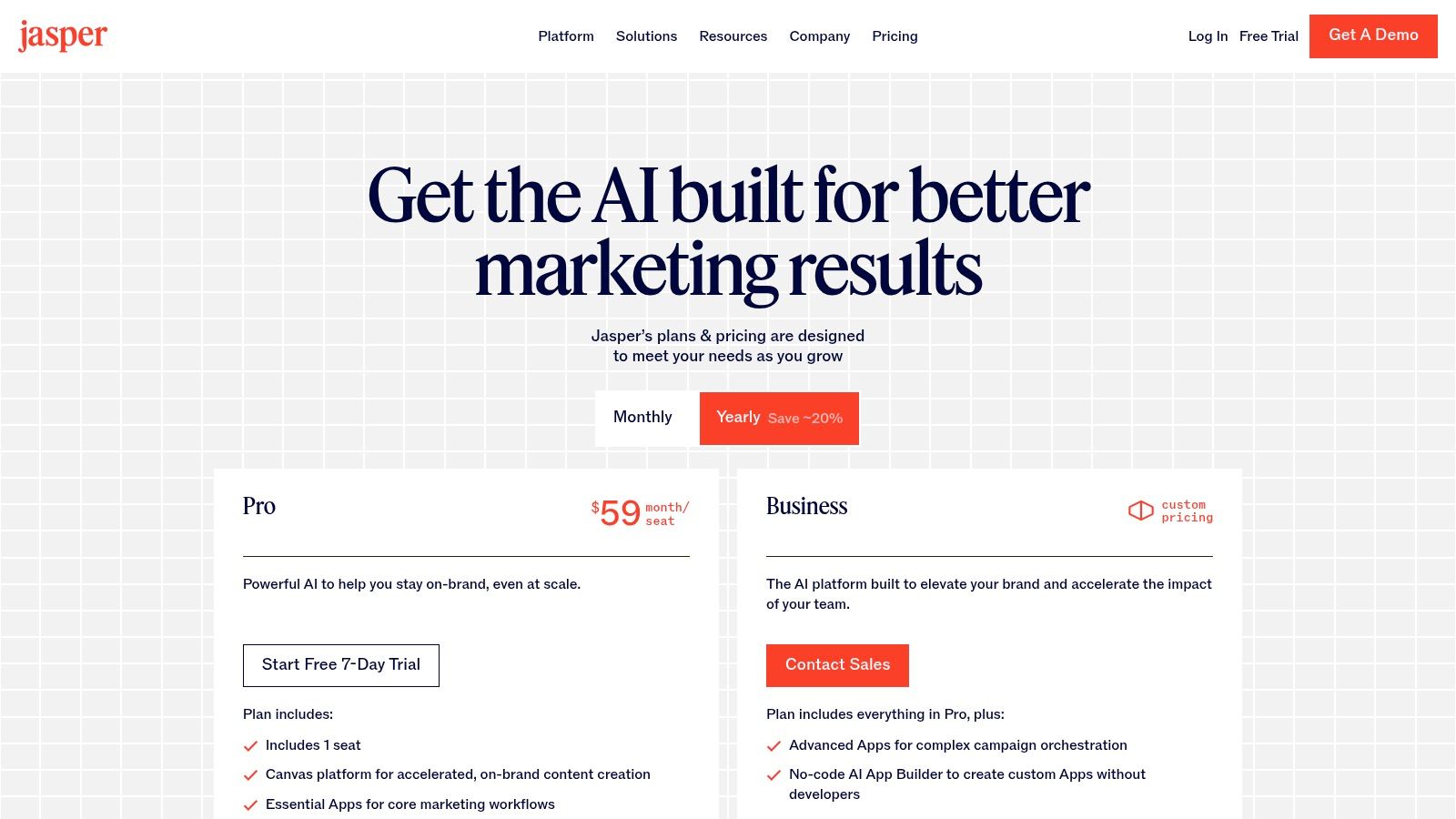
Unlike general-purpose chatbots, Jasper provides marketing-focused templates and campaign-building workflows (like "Instant Campaigns") to streamline the entire content creation process. For marketers looking to streamline their workflows, understanding the nuances of content automation can be a game-changer. Jasper's browser extensions also allow users to leverage its AI capabilities directly within their existing tools, such as Google Docs or WordPress, reducing friction and context switching.
Key Details & Pricing
- Best For: Marketing teams and agencies needing to produce high-volume, on-brand content with consistent voice and messaging.
- Pros: Strong marketing-specific templates, excellent brand voice controls, and useful browser extensions. A 7-day free trial allows for thorough testing.
- Cons: The seat-based pricing model can become costly for larger teams, and some users have noted a need to carefully review billing terms to avoid surprises.
- Pricing: Tiers start with a Creator plan, followed by Pro and Business plans designed for teams and enterprises. A free trial is available.
For those interested in exploring how Jasper compares to other AI applications, you can learn more about its place in the broader AI app ecosystem.
Website: https://www.jasper.ai
3. HubSpot Marketing Hub
HubSpot Marketing Hub has evolved into a full-stack marketing automation suite that deeply integrates AI into its core CRM platform. Rather than offering a standalone AI tool, HubSpot embeds AI assistants across its entire marketing ecosystem, from email creation and journey automation to attribution reporting and ad management. This makes it one of the best AI marketing tools for businesses seeking a unified platform where AI enhances existing workflows instead of adding another separate tool to their stack.

The platform’s strength lies in its deep CRM integration, allowing AI-powered analytics to provide insights into the entire customer lifecycle. Marketers can use AI to generate content, predict lead scores, and optimize campaign journeys based on real customer data. HubSpot’s extensive app ecosystem and its renowned Academy resources also provide a solid foundation for teams of any size to scale their operations. For those looking to understand how this integrated approach impacts agencies, you can explore how AI is redefining advertising campaigns.
Key Details & Pricing
- Best For: Businesses of all sizes, from startups to enterprises, that want an all-in-one, CRM-powered marketing platform with embedded AI capabilities.
- Pros: A true all-in-one solution with mature automation and analytics, scales from free tools to enterprise, and offers strong onboarding and support.
- Cons: Professional and Enterprise tiers can have mandatory onboarding fees, and the contact-based pricing model can become expensive as your list grows.
- Pricing: A range of tiers is available, including free tools, Starter, Professional, and Enterprise plans, with costs scaling based on the number of marketing contacts.
Website: https://blog.hubspot.com/marketing/hubspot-marketing-hub-pricing?utm_source=openai
4. Semrush
Semrush has long been an essential toolkit for SEO and SEM professionals, but its evolution into one of the best AI marketing tools comes from integrating AI across its massive data-driven platform. Beyond its renowned keyword and competitor analysis, Semrush now offers AI-powered features like ContentShake AI for content ideation and drafting, and automated AI replies for local SEO management. This blend of robust data and AI assistance allows marketers to build strategies grounded in proven search trends while accelerating execution.
What sets Semrush apart is its ability to connect AI-driven content creation directly to organic and paid growth opportunities. A user can identify a high-value keyword, analyze top-ranking content, and then use the AI writing assistant to draft an article optimized for that specific search query, all within one ecosystem. Its modular structure allows teams to select toolkits for SEO, content marketing, social media, and advertising, making it a scalable solution for data-driven marketing.
Key Details & Pricing
- Best For: SEO specialists, content marketers, and digital marketing agencies who need data-backed insights to guide their AI-powered content and advertising strategies.
- Pros: Industry-leading data for competitive and keyword research, modular toolsets that can be tailored to specific team needs, and free trials available for most toolkits.
- Cons: The pricing structure and numerous add-ons can be complex to navigate, and some of the newer AI content tools have usage limits on lower-tier plans.
- Pricing: Offers Pro, Guru, and Business plans with varying levels of access and features. A limited free account is also available.
Website: https://www.semrush.com/kb/856-subscription-plans-comparison?utm_source=openai
5. Mailchimp
Mailchimp has evolved from a simple email newsletter service into an all-in-one marketing platform for small and medium-sized businesses, integrating AI to enhance its core offerings. It leverages artificial intelligence primarily to optimize email marketing campaigns. Features like the AI Content Optimizer suggest improvements for subject lines, headlines, and body copy to increase engagement, while send-time optimization analyzes user data to deliver messages when subscribers are most likely to open them. This makes it one of the best AI marketing tools for businesses focused on scaling their email and automation efforts efficiently.
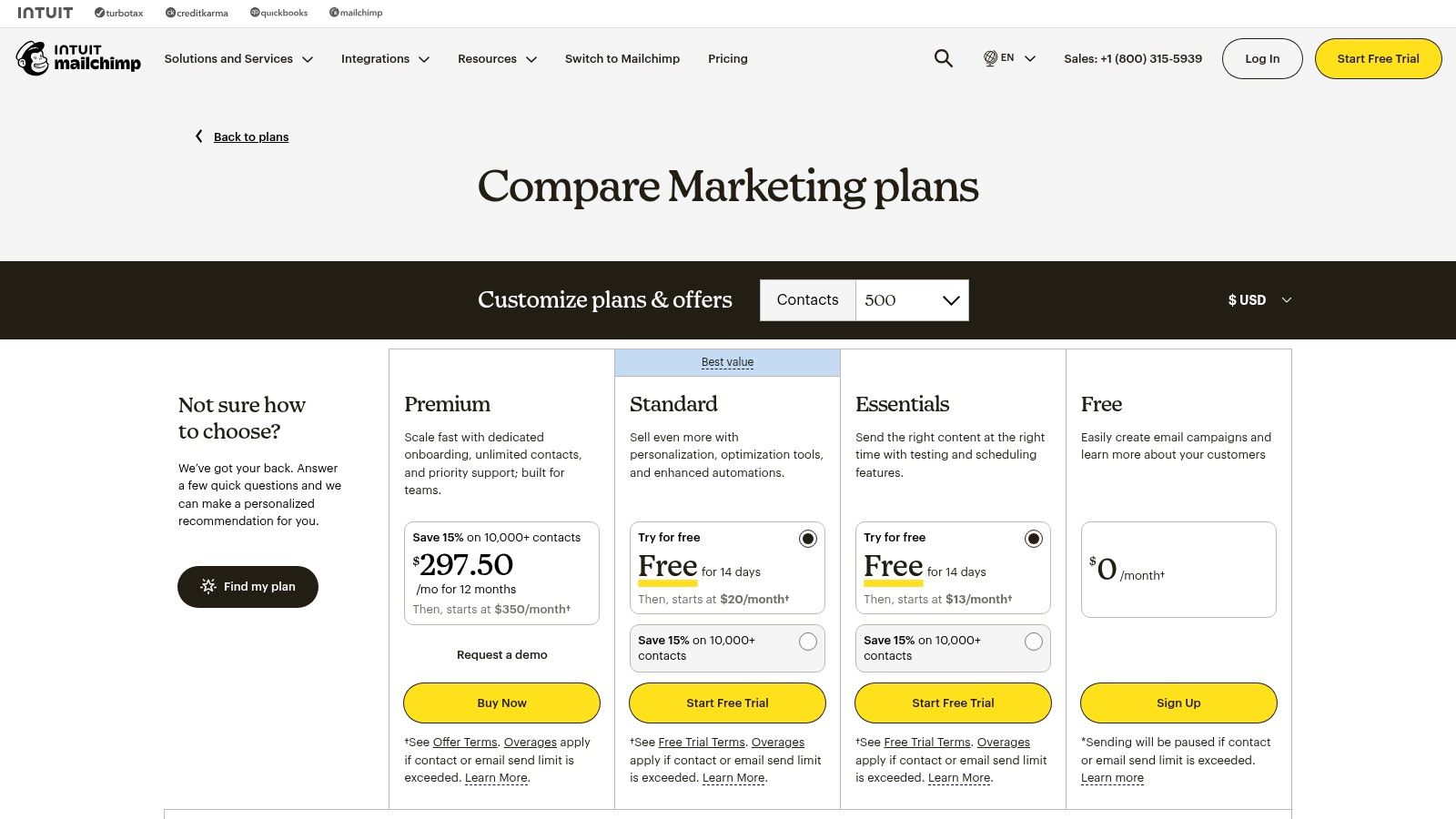
Beyond email, Mailchimp offers a suite of connected tools including a basic CRM, marketing automations, and builders for forms and landing pages. Its extensive library of templates and straightforward user interface provides a gentle learning curve, allowing small teams or founders to launch campaigns quickly without a steep technical barrier. The platform's broad integration capabilities ensure it can connect with other essential business tools, creating a more unified marketing ecosystem.
Key Details & Pricing
- Best For: SMBs and startups needing an easy-to-use, all-in-one platform to launch and scale their email marketing and automation.
- Pros: Gentle learning curve with solid free/entry-level options, quick to launch for small teams, and a large library of templates and guidance.
- Cons: Advanced features and higher contact volumes can significantly increase costs, and the free plan includes mandatory brand watermarking and limitations.
- Pricing: A free plan is available for up to 500 contacts. Paid plans include Essentials, Standard, and Premium, with pricing scaling based on contact list size.
Website: https://mailchimp.com/pricing/marketing/compare-plans/?utm_source=openai
6. Hootsuite (OwlyWriter AI / OwlyGPT)
Hootsuite integrates AI directly into its established social media management platform, positioning its OwlyWriter AI as a native assistant rather than a standalone tool. This approach embeds AI-powered content creation directly within the familiar social media scheduling and analytics workflow. Its key advantage is context-aware assistance; it generates content ideas, captions, and hashtag suggestions that are not just generic but are also informed by current social media trends and conversations.
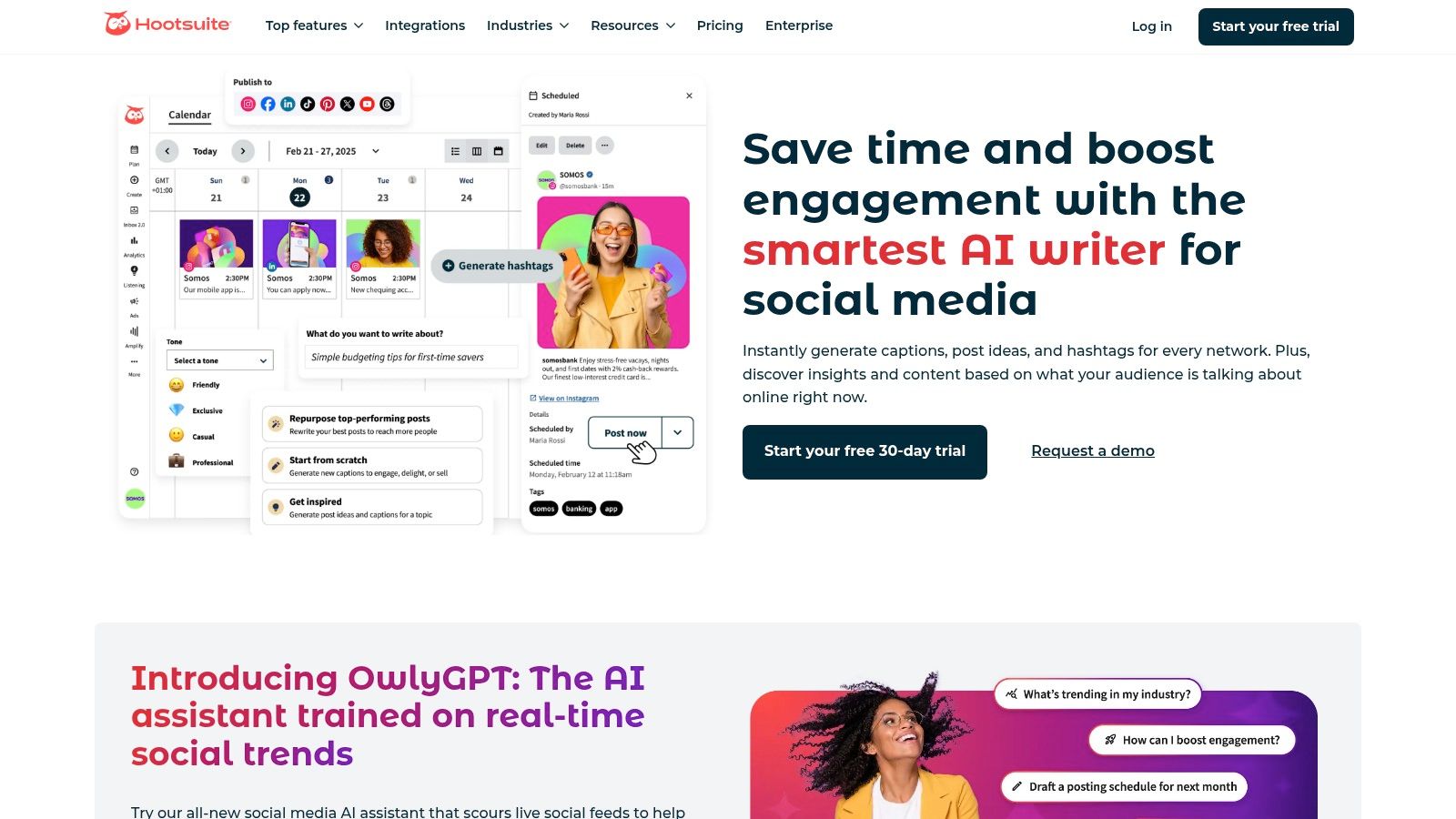
Unlike many separate AI writing tools, Hootsuite’s AI is designed for the specific cadence and format of social media. It can help turn a single idea into multiple post variations tailored for different platforms, rewrite successful evergreen content for a new campaign, or even summarize social listening data. For social media managers who live inside their management platform, having one of the best AI marketing tools embedded directly into their daily process eliminates the need to switch between applications for content ideation and scheduling.
Key Details & Pricing
- Best For: Social media managers and marketing teams who want AI-powered content assistance integrated directly into their existing scheduling and analytics platform.
- Pros: Seamless integration into social media workflows, trend-aware content ideation, and a mature platform with robust analytics and scheduling features.
- Cons: AI features are tied to the broader Hootsuite subscription, and the pricing structure can be complex. Usage limits or tokens may apply to certain AI tools depending on the plan.
- Pricing: Available across Professional, Team, and Enterprise plans, with feature access varying by tier. A 30-day free trial is typically offered.
Website: https://www.hootsuite.com/platform/owly-writer-ai?utm_source=openai
7. Canva Magic Studio
Canva Magic Studio integrates a powerful suite of AI tools directly into its well-known design platform, transforming it into an end-to-end creative engine for marketers. It excels at rapidly generating a wide range of marketing assets, from social media posts and ad creatives to presentations and videos, all from a single prompt. This makes it one of the best AI marketing tools for lean teams and founders who need to produce diverse, on-brand visual content without extensive design resources.
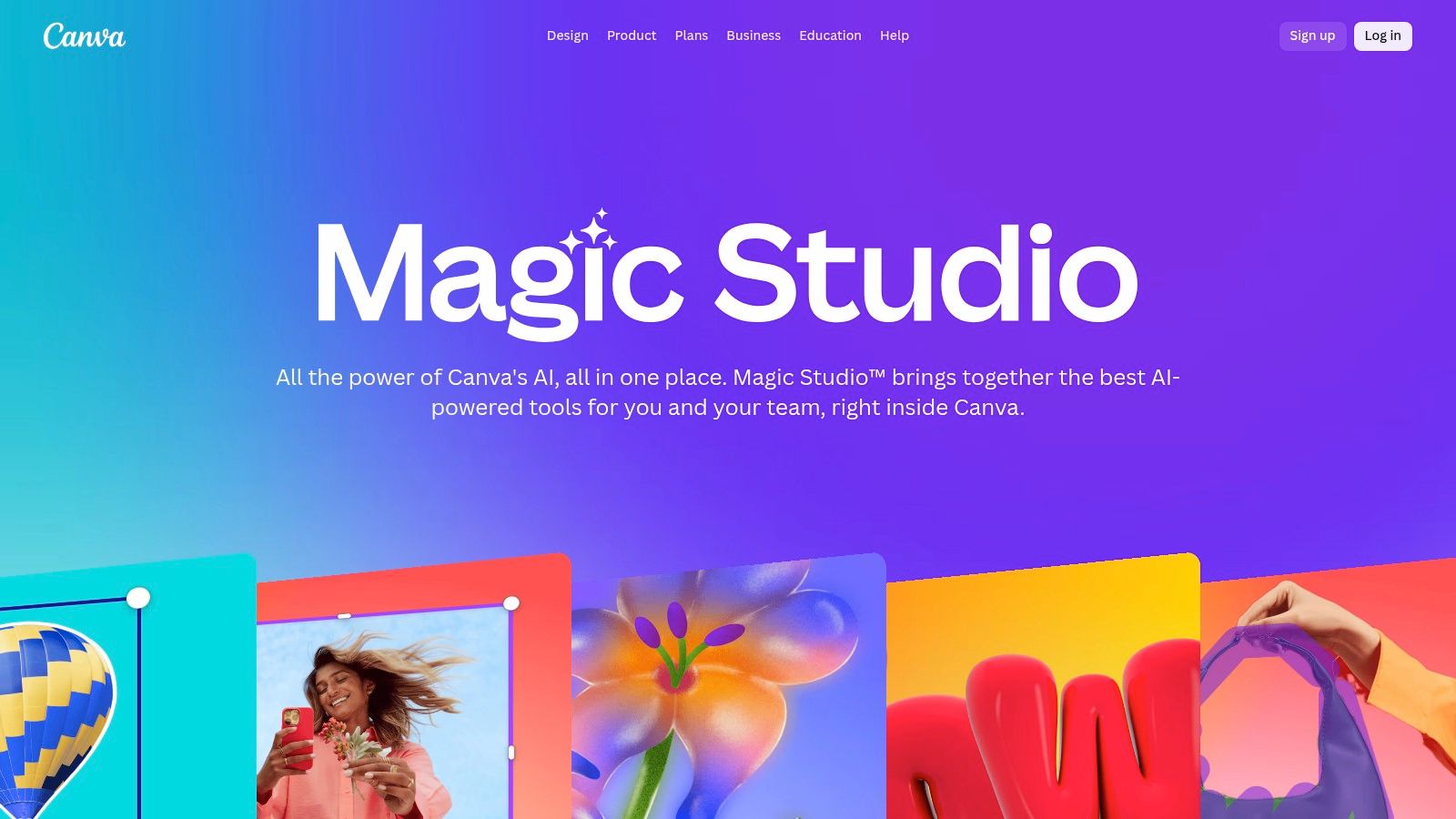
Unlike standalone AI generators, Magic Studio leverages Canva's massive template library and intuitive drag-and-drop editor. Users can instantly generate designs with "Magic Design," create copy with "Magic Write," or even produce short videos from text prompts. The inclusion of brand kits ensures that all AI-generated content remains consistent with brand guidelines, a critical feature for businesses focused on maintaining a cohesive brand identity across all marketing channels.
Key Details & Pricing
- Best For: Small businesses, marketing managers, and solopreneurs needing a fast, affordable way to create a high volume of multi-format marketing creative.
- Pros: Extremely fast from prompt to ready-to-use creative, affordable Pro tier, and excellent collaboration and brand control features.
- Cons: Some of the most powerful AI tools are gated behind paid plans or have usage limits on the free tier, and users occasionally report access hiccups with new features.
- Pricing: A robust free plan is available. Paid plans include Pro and Teams, which unlock premium features, more AI credits, and advanced brand management tools.
Website: https://www.canva.com/magic/?utm_source=openai
8. Adobe Marketo Engage
Adobe Marketo Engage is an enterprise-level marketing automation powerhouse designed for the complexities of B2B engagement. It leverages AI not just for simple tasks, but for orchestrating sophisticated, multi-touch customer journeys. Its core strength lies in its ability to manage advanced lead scoring, nurture complex sales cycles, and deliver highly personalized experiences at scale, making it one of the best AI marketing tools for organizations with intricate go-to-market strategies.
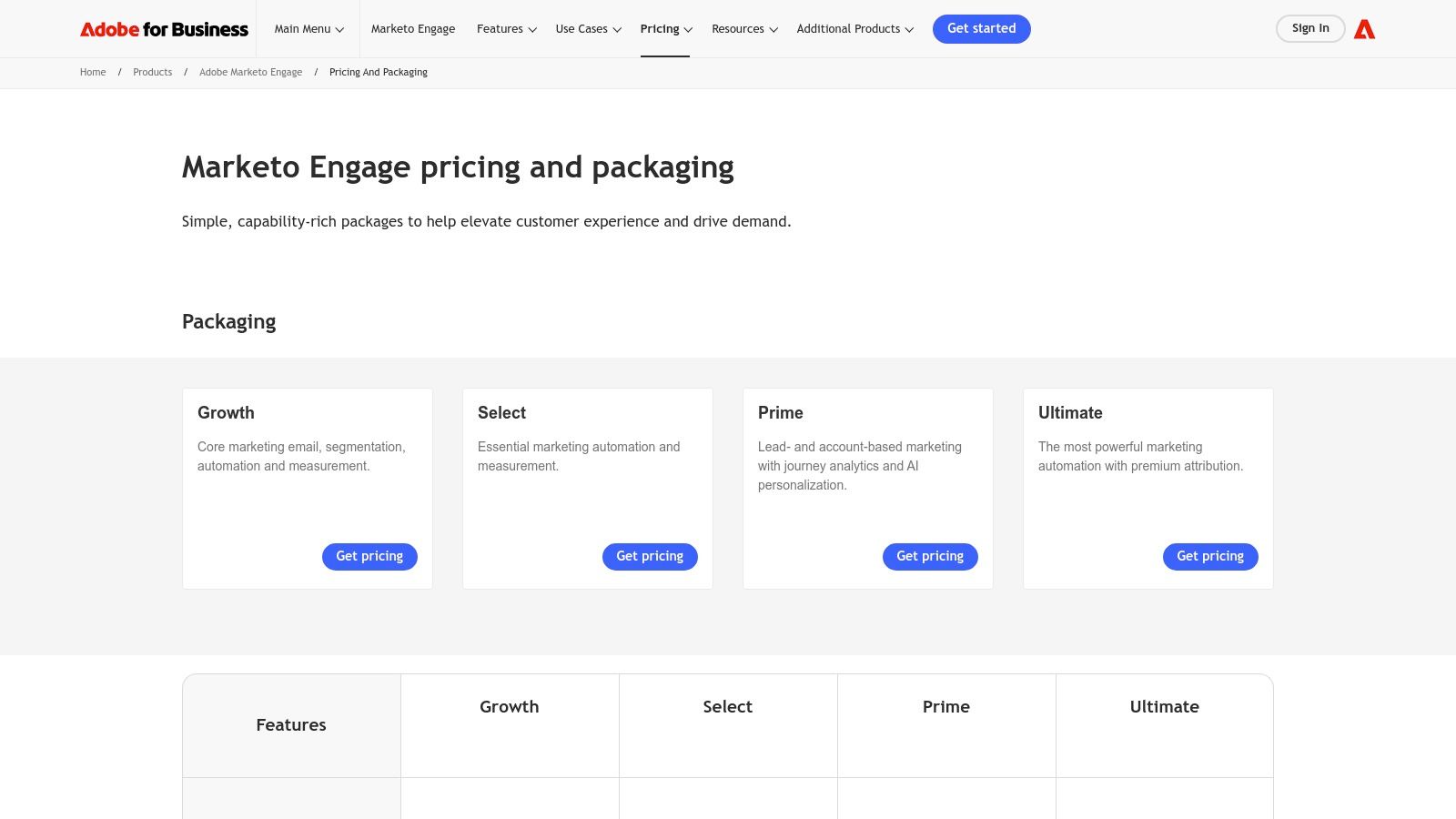
Unlike many tools focused on top-of-funnel activities, Marketo excels in the entire customer lifecycle, from initial acquisition to advocacy. It uses AI to power predictive audiences, personalize content in real-time, and provide deep journey analytics that reveal what's truly driving revenue. With native integrations into major CRM platforms like Salesforce and Microsoft Dynamics, it serves as the central hub for aligning marketing and sales efforts around data-driven insights, particularly for account-based marketing (ABM) initiatives.
Key Details & Pricing
- Best For: Large B2B enterprises and organizations that require a powerful, scalable marketing automation platform for managing complex sales funnels and ABM campaigns.
- Pros: Extremely powerful for complex B2B programs, offers deep native CRM integrations, and provides enterprise-grade governance and reporting.
- Cons: The platform has a steep learning curve and typically requires dedicated marketing operations resources to maximize its value. Pricing is quote-based and can be a significant investment.
- Pricing: Pricing is customized based on database size and feature requirements. Prospective users must contact the Adobe sales team for a quote.
Website: https://business.adobe.com/products/marketo/value-add-ons?utm_source=openai
9. Shopify App Store – AI‑Powered Marketing Apps
For ecommerce businesses built on Shopify, the AI App Store is less a single tool and more a curated gateway to an entire ecosystem of specialized AI marketing solutions. It provides a direct path for merchants to integrate powerful AI capabilities, from automated product descriptions and SEO optimization to sophisticated ad creative generation and campaign analytics. This marketplace model makes it one of the best AI marketing tools for store owners who need plug-and-play solutions that work seamlessly within their existing platform.
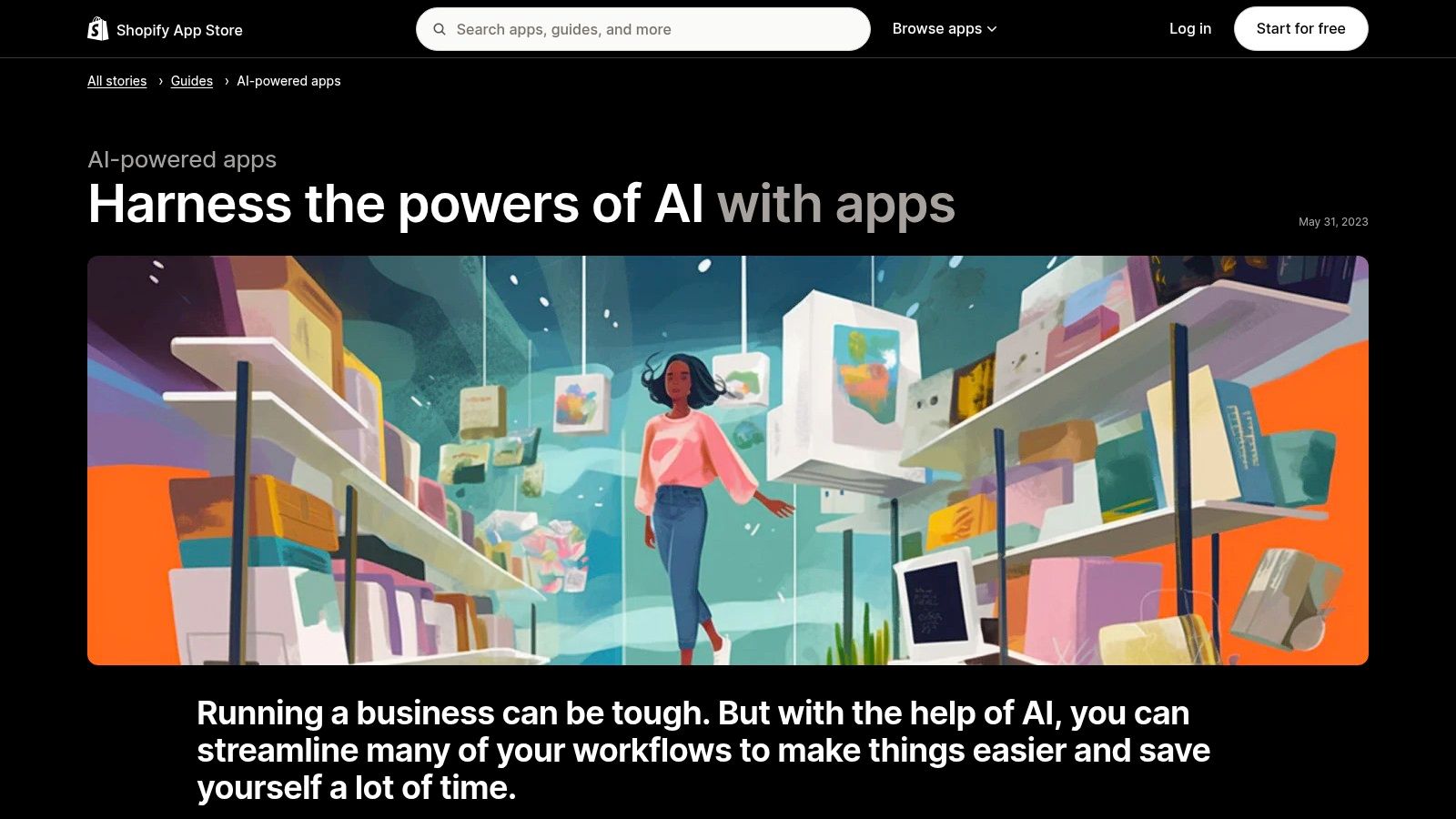
Unlike standalone platforms, the apps here offer deep, direct integrations with a merchant's product catalog, customer data, and core marketing channels like Meta, Google, and Klaviyo. The user experience is streamlined through Shopify's familiar interface, with category guides spotlighting vetted apps, and clear pages detailing pricing, features, and user reviews. This simplifies the often-complex process of adopting new technology by centralizing installation, billing, and support through a trusted environment.
Key Details & Pricing
- Best For: Shopify merchants looking to quickly and easily add specialized AI marketing functions directly into their existing ecommerce workflow.
- Pros: Wide selection of vetted apps across all marketing needs, simple installation and unified billing through Shopify, and transparent user reviews to guide choices.
- Cons: App quality and pricing vary significantly, requiring careful evaluation of each tool. The platform is almost exclusively beneficial for businesses already operating on Shopify.
- Pricing: Varies by app. Most apps offer a free trial or a free plan, with paid tiers scaling based on usage, features, or store revenue.
Website: https://apps.shopify.com/stories/guide-ai-powered-apps?utm_source=openai
10. G2
While not an AI tool itself, G2 is an indispensable resource for navigating the crowded AI marketing landscape. It functions as the largest B2B software review directory, providing a crucial platform for comparing the best AI marketing tools side-by-side. Its value lies in aggregating verified user reviews, which offer real-world insights into a tool's performance, ease of use, and customer support, moving beyond slick marketing copy.

For marketing managers and agency owners, G2’s live grids and powerful filters are its standout feature. You can drill down into specific categories like "AI Writing Assistants" or "Marketing Analytics," then sort vendors by satisfaction scores, market presence, or specific features. This data-driven approach allows you to create a well-researched shortlist of potential solutions tailored to your team's exact needs, saving countless hours of independent research and vetting.
Key Details & Pricing
- Best For: Marketers, founders, and agency owners conducting due diligence before investing in new software.
- Pros: Broad coverage of both leading and emerging AI tools, real-world user feedback to aid shortlisting, and a direct comparison environment to evaluate options.
- Cons: Sponsored placements can influence visibility, and the depth of reviews can vary, making it wise to cross-reference findings with other sources.
- Pricing: Free to use for browsing and comparing software reviews.
Website: https://www.g2.com/categories?utm_source=openai
11. Capterra
Capterra serves not as an AI tool itself, but as an essential research hub and software marketplace where marketers can compare the best AI marketing tools. Owned by Gartner, it provides detailed roundups, user reviews, and pricing snapshots that help businesses navigate the crowded AI landscape. Its real value lies in its structured comparison framework, allowing users to filter tools by specific features, business size, and industry.
This platform is particularly useful for small to medium-sized businesses (SMBs) that need to quickly vet multiple options without visiting dozens of individual websites. Capterra aggregates vendor profiles, key features, and review summaries into a digestible format. By using its filters, a marketing manager can efficiently narrow down a list of potential AI-powered content generators or ad creation tools, compare their starting prices, and click directly through to official trial pages, streamlining the procurement process significantly.
Key Details & Pricing
- Best For: Marketing managers and founders at SMBs who need to research, compare, and shortlist multiple AI tools efficiently.
- Pros: Useful for quick pricing ranges and feature comparisons, strong coverage of SMB-oriented tools, and easy click-through to vendor sites.
- Cons: Sponsored profiles can influence placement, so it's wise to verify details directly on vendor sites. Some lists may also lag behind the newest product releases.
- Pricing: Free to use for research and comparison.
Website: https://www.capterra.com/resources/ai-marketing-tools/?utm_source=openai
12. AppSumo
AppSumo is not a single AI tool but a marketplace that offers significant, time-limited discounts on emerging software, including many of the best AI marketing tools. It provides an opportunity for marketers and small businesses to acquire powerful applications through lifetime deals (LTDs) or heavily reduced annual subscriptions. This model makes it an exceptional resource for experimenting with new technology without committing to expensive recurring fees, allowing teams to test niche solutions that could provide a competitive edge.

The platform’s value lies in its community-driven insights; each listing features extensive user reviews, ratings, and a Q&A section where potential buyers can directly ask the software founders about features and roadmaps. This transparency helps mitigate the risk associated with investing in newer companies. For frugal founders or agencies building their tech stack, AppSumo is an essential destination for discovering and vetting innovative tools at a fraction of their standard market price, though due diligence on vendor stability is crucial.
Key Details & Pricing
- Best For: Solopreneurs, startups, and agencies on a budget looking to build a diverse marketing tech stack with lifetime deals.
- Pros: Access to heavily discounted and lifetime licenses, a wide variety of emerging AI tools, and a community review system for vetting products.
- Cons: The "lifetime" nature of a deal depends on the vendor's longevity, and some deals have feature limitations compared to direct subscriptions.
- Pricing: Varies per deal, with most offered as a one-time payment for lifetime access. AppSumo also has a Plus membership for additional discounts.
Website: https://appsumo.com/p/l/10-best-ai-tools-appsumo?utm_source=openai
Top 12 AI Marketing Tools: Features & Pricing
ProductCore featuresUX / Quality (★)Price & Value (💰)Target audience (👥)Unique selling point (✨)quickads.ai 🏆AI image & video gen, faceless YT shorts, virtual photoshoots, 20M+ AI‑scored ads library, one‑click publish4.7★ (200+ reviews)💰 $1 trial → All‑Access $99/mo; license tiers $69–$739; enterprise options👥 D2C brands & agencies needing fast, scalable ad creative✨ 20M+ ads dataset + end‑to‑end create → optimize → publishJasperBrand voice controls, campaign builder, templates, browser extensions★★★★💰 Tiered (solo → team → enterprise), 7‑day trial👥 Marketing teams and content creators✨ Strong brand voice + collaborative campaign workflowsHubSpot Marketing HubCRM‑native automation, AI assistants, ads & attribution, journeys★★★★💰 Free → Enterprise (contact‑based, onboarding fees possible)👥 SMBs → enterprises needing unified CRM + marketing✨ Deep CRM integration for lifecycle reporting & attributionSemrushKeyword & competitive research, AI content tools, social/local add‑ons★★★★💰 Modular subscriptions & add‑ons (varies by toolkit)👥 SEO/SEM teams and data‑driven marketers✨ Robust competitive data for organic + paid strategyMailchimpAI email content, send‑time optimization, automations, basic CRM★★★★💰 Free tier → paid by contacts (advanced features cost more)👥 SMBs launching or scaling email marketing✨ Email‑first automation + easy templates and onboardingHootsuite (OwlyWriter)AI captions/images, hashtag suggestions, scheduling, listening★★★★💰 Tiered plans; AI usage limits may apply👥 Social teams needing scheduling + AI ideation✨ AI embedded into social workflows + listening analyticsCanva Magic StudioPrompt‑to‑design visuals, Magic Write/Edit, brand kits, templates★★★★💰 Free → Pro (affordable for small teams)👥 Lean teams & designers needing rapid multi‑format creative✨ Fast prompt→campaign visual creation with brand kitsAdobe Marketo EngageAI personalization, lead scoring, journey analytics, ABM tools★★★★💰 Enterprise / quote pricing👥 Large B2B organizations with complex ABM programs✨ Advanced B2B personalization, scoring & enterprise governanceShopify App Store – AI AppsCurated AI marketing apps, trials, app pages with reviews & pricing★★★★ (varies)💰 Varies by app; billing via Shopify👥 Shopify merchants seeking plug‑in AI tools✨ Quick install of vetted AI apps tailored for ecommerceG2Live grids, filters, verified user reviews, vendor linksN/A (review platform)💰 Free to browse; vendor pricing linked👥 Buyers shortlisting software & comparing vendors✨ Verified reviews + side‑by‑side comparison gridsCapterraVendor pages, pricing snapshots, feature filters, editorial roundupsN/A (review platform)💰 Free to browse; links to vendor trials👥 SMB buyers researching quick pricing & features✨ Fast pricing snapshots and SMB‑focused comparisonsAppSumoTime‑limited & lifetime deals, community Q&A, refundsN/A (deal marketplace)💰 Heavily discounted / time‑limited offers👥 Entrepreneurs, side‑projects, and experimenters✨ Low‑cost way to test AI tools (often lifetime deals)
Choosing the Right AI Tools for Your Marketing Stack
Navigating the landscape of AI-powered marketing can feel like assembling a complex puzzle. We've explored a diverse set of the best AI marketing tools, from dedicated ad generators like Quickads.ai and content powerhouses such as Jasper, to comprehensive platforms like HubSpot Marketing Hub and Adobe Marketo Engage. The key takeaway is clear: there is no single "best" tool, only the best tool for your specific challenge, budget, and team structure.
The true power of AI in marketing isn't just about automating a single task; it's about building an interconnected, intelligent "stack" that amplifies your team's creativity and strategic capabilities. The right combination of tools can transform your entire workflow, from initial audience research and content creation to campaign execution, personalization, campaign performance reviews, and performance analysis. This stack-based approach mirrors how AI-driven platforms are transforming other business functions as well. For example, Manatal (AI Recruitment Software) designed to source and hire candidates faster. Tailored for HR teams, recruitment agencies, and headhunters, applies automation, AI-driven insights, and centralized data to streamline recruitment workflows.
How to Select Your AI Marketing Toolkit
Selecting the right tools requires a strategic, not a reactive, approach. Avoid the temptation to adopt a tool simply because it's popular. Instead, begin with a clear audit of your current marketing processes and identify the most significant bottlenecks or areas for improvement.
Consider these critical factors during your evaluation:
- Integration Capabilities: How well does a new tool fit into your existing ecosystem? A powerful standalone tool can create more problems than it solves if it doesn't seamlessly connect with your CRM, analytics platform, or social media scheduler. Look for robust API access and native integrations with platforms you already rely on.
- Scalability and Pricing Models: Your needs will evolve. A tool that's perfect for a small startup might become prohibitively expensive or functionally inadequate as your company grows. Scrutinize pricing tiers carefully. Is the cost based on users, contacts, feature sets, or usage volume? Ensure the model aligns with your projected growth.
- User Experience and Learning Curve: A sophisticated tool is useless if your team finds it too complex to operate. Consider who will be the primary user. Is it a seasoned data analyst or a creative strategist? Seek out tools with intuitive interfaces, strong documentation, and responsive customer support to ensure high adoption rates.
- Specific Use-Case Alignment: Don't buy a comprehensive marketing suite if you only need to solve a content generation problem. If your primary goal is to boost organic traffic, for instance, your focus should be on specialized AI-driven solutions for keyword research, content optimization, and technical analysis. For marketers specifically looking to enhance their search engine optimization with artificial intelligence, exploring focused lists can be incredibly beneficial. Consider these 12 Best AI SEO Tools That Actually Drive Results to find platforms tailored for that exact purpose.
Your Next Steps: From Selection to Implementation
The journey doesn't end once you've chosen a tool. Successful implementation is where the real value is unlocked. Start small with a pilot project or a single campaign to test the tool's effectiveness and gather real-world feedback from your team. This allows you to build a strong business case for wider adoption and work out any process kinks before a full-scale rollout.
Remember that AI is a co-pilot, not an autopilot. These platforms are designed to augment human intelligence, freeing up your team from repetitive tasks so they can focus on high-level strategy, creative ideation, and building genuine customer relationships. Embrace a mindset of continuous learning and experimentation. The world of AI marketing is dynamic, and staying agile is your greatest competitive advantage. The tools you choose today will shape the efficiency, creativity, and ultimate success of your marketing efforts tomorrow.
Ready to supercharge your advertising with the power of AI? quickads.ai makes it effortless to generate high-performing ad creatives, scripts, and complete campaigns in seconds, helping you scale your marketing without scaling your team. See how the future of ad creation works by visiting quickads.ai and start your first project today.










